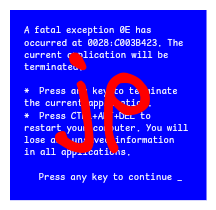I think this thread is meant to flatter programmers and make linguists and sociologists extremely angry.
As someone with a background in linguistics, my jimmies are indeed rustled.
Does Russian have stricter grammar syntax than German? I was a bit puzzled by the comparison made above
IDK, comparing Javascript to English while Java to German seems to either overblow the value of javascript or diminish the value of English.
Yeah German isn’t nearly as bad as Java either. Also what is asm? Phoenetic script?
makes sense though. the definition on english speakers and js devs is accurate, english derived from german and js derived from java.
English is derived from Latin as it was taught by Roman Legionaries, but German has large influences from both Latin and Indo-European languages.
How so? Except the first sentence which is obviously not serious, I would agree with all linguistic statements or at least not disagree with any.
For one, Latin has more fancy rules than French. I guess the subjunctive is probably something English speakers might consider fancy, but Latin has that too. Latin has more times that are conjugations of the core verb (rather than needing auxiliary verbs), has grammatical cases (like German, but two more if you include vocative) and, idk, also just feels fancier in general.
I’ll admit it’s been years since I actually read any Latin and that I only have a surface level understanding of all languages mentioned except for French, but this post reads like it’s about the stereotypes of the countries rather than being about the languages themselves.
First, I wouldn’t count the vocative but let’s not get into this debate. Counting cases, Russian wins until you include other balto slavic languages or even Uralic ones.
Fancy is a very subjective term. Auxiliary verbs are fancy in their own way. From an orthographical viewpoint, French is quite fancy with all the silent letters, the way vocals are pronounced and stuff. French had like one spelling “reform” and it was like let’s make it more obvious we decent from Latin. Grammar wise it’s just like the other romance languages from what I know. They once got rid of the silent <s> and put a “gravestone” on the letter before (^) that has no other meaning than here was a silent s. Wouldn’t you call that fancy? Who would call it fancy?
MwaMoi!deleted by creator
To be clear, in general the vocative is a case eg in Czech and other balto slavic languages (except eg standard Russian while colloquial Russian is developing a new unrelated one).
In Latin tho, it’s more a relict. Other cases have relicts, too, still I wouldn’t say Latin has the locative.
I would argue that being a relict is a spectrum. Technically, it is a case with many syncretism to nominative, since it is obligatory for those nouns. In the context of LAtiN hAs sOo0 ManY cAsES, it’s not.
deleted by creator
and there are vestiges of a seventh, the Locative.
I called it relicts but it’s basically what I said. Maybe vestiges is the better word in English, in German we say “Relikte”.
Meh, as a native Dutch speaker auxiliary verbs feel really utilitarian to me, and not particularly fancy - like you said, that’s highly subjective.
As for cases, I didn’t say Latin or German had the most, but just that I think they’re fancy and that Latin has them while French doesn’t.
So you speak a V2 language like me? I’m German btw. Let me give you an outside perspective on auxiliary verbs in continental western Germanic languages:
The verb comes in second position (hence V2). Using an auxiliary verb moves the content verb to the very end of the sentence. It totally messes with the syntax.
But that’s besides my point. My point wasn’t that French auxiliary verbs are fancy but that fancy can me many things, in French it’s the spelling and pronunciation. Cases aren’t fancy, at least not the German or Latin ones. The slavic cases are a different story, in my objective opinion.
Latin has more rules, but they’re more utilitarian than fancy. Latin rules are there to make sure you understand exactly what is being said. French rules are there to make everything elegant and confusing, like high fashion.
I think the first sentence is probably enough to make anyone not afflicted with a eurocentric brain want to palm some face.
I think excusing it as a “not serious” statement is dangerous, as a lot of people even on Lemmy won’t second guess it.
The belief that the west is the origin of all science and culture is surprisingly pervasive, especially in the tech industry.
“The root of all modern languages” is a heck of a thing to say about Latin, and I’m pretty sure several billion people haven’t quite gotten that memo. Calling a chunk of Europe and a thin slice of Africa “the entire Universe” is also a spicy take. Come for the programmer humor, recoil in disgust for the rampant ethnocentrism, I guess.
I don’t disagree but I would still give the benefit of a doubt that “the whole universe” is such an exaggeration that it makes the overstatement obvious. But it would also be read as a praise. Overall, I wouldn’t take it all to seriously. Made me laugh but I also see the eurocentrism and it’s good to be aware of it.
I mean, French is vulgar Latin at best. And even if it wasn’t obviously spoken by all sorts of French people, elites or not, it’s also the official language of a bunch of other countries, from Monaco to Niger. “Elites and certain circles” is a very weird read, which I’m guessing is based on US stereotypes on the French? I don’t even think the British would commit to associating the French with elitism.
Russian speakers being “mostly autoritarian left” is also… kind of a lot to assume? I’m not even getting into that one further. I don’t know if the Esperanto one checks out, either. “Esperanto speaker” is the type of group, and this is true, whose wikipedia page doesn’t include statistics but instead just a list of names. Which is hilarious, but maybe not a great Python analogue. It may still be the best pairing there, because to my knowledge English speakers aren’t any worse at speaking English than the speakers of any other language. They are more monolingual, though.
It just all sounds extremely anglocentric to me, which is what it is, I suppose, but it really messes with the joke if you’re joking about languages specifically. One could do better with this concept, I think.
I think the elitism regards of French isn’t about French native speakers but about second language learners. French was the lingua franca in Europe for quite a while and using French loan words makes you sound more fancy and eloquent in many languages (compare “adult” with “grownup” which is a Latin loan word but I can’t think of a real example so I hope no one will notice).
The Russian bit I totally agree. Esperanto vs python is quite a leap, I agree. Showing a list (that’s probably not conclusive but still) is telling when compared to the go to beginners programming language. Still there are parallels in the design and intention. No comparison is ever perfect.
All in all it’s not perfect but as a joke, it works for me. Sure, it’s not unbiased but if not taken too seriously, I can laugh about it, and I can over analyze it for fun so win win for me.
It’s kinda funny, I’m Flemish and a lot of French loan words (ambriage, merci, nondedju = nom de dieu to name a few) are mainly used in dialect, and therefore don’t make you sounds sophisticated or worldly at all.
From what I know it’s similar in Swiss German (with words like merci and velo (bike)). I don’t know about Fleming but Swiss embraces their dialects so it isn’t stigmatized either
Heh, we use velo as well. And yeah, we don’t really stigmatise dialects that much either, though depending on how much dialect you use people might find it unprofessional.
Yeah, but that’s my point. The author clearly isn’t thinking about the hundreds of millions of native French speakers around the world, they’re an American thinking the word “mutton” sounds fancier than “sheep”… in English.
Which yeah, okay, that’s their cultural upbringing causing that, but then maybe don’t make a joke entirely predicated on making sharp observations about how languages work and aimed specifically at nerds. I can only ever go “it’s funny because it’s true” or be extremely judgmental of your incorrect assumptions about how languages work here.
your incorrect assumptions
Why make it about me? I was more or less playing devil’s advocate, saying if not taken seriously it’s funny.
I would be more likely to agree with you if you put “OP’s assumption”. Your phrasing makes me want to double down on my original position.
That’s just a general recommendation for discussions in general, online and offline. I learned a thing or two about my biases and perspectives here. Btw I’m German and that part resonated with me from my little experience with JAVA and my experience in learning about my native language and teaching it to others.
Oh, sorry, you misunderstood, I didn’t mean you specifically, I mean you as in “why would you ever do this”, as in “why would anybody ever do this”.
Languages, as we’ve established, are complicated.
I suspect there’s more people who speak Python fluently than Esperanto. So that comparison sits very wrong with me. The rest was funny :)
Esperanto always struck me as more perl-like with each part of speech having its own suffix like perl has $ for scalars, @ for arrays, and % for hashes. Though perl is probably more like a bunch of pidgins…
Yeah, I was about to say.
Perl 5 is like Esperanto: borrowed neat features from many languages, somehow kinda vaguely making a bit of sense. Enjoyed some popularity back in the day but is kind of niche nowadays.
PHP is like Volapük: same deal, but without the linguistic competence and failing miserably at being consistent.
Raku (Perl 6) is like Esperanto reformation efforts: Noble and interesting scholarly pursuits, with dozens of fans around the multiverse.
Esperanto’s equivalent would probably be Haskell.
Python is probably more like Spanish. Very easy basics, but then people from different regions of where it’s has spread out barely understand each other
It’s probably a similar learning speed
Nobody mentioned number of speakers though
No, but the adoption rate is likely related to how useful the language is?
Is this post sane-washing Russia? What’s left about Russia under Putin? Overall funny, though
It’s a post by the lemmy dev, so yeah that’s a given
Removed by mod
PHP is Russian. Used to be huge, caused lots of problems, now slowly dwindling away. Its supporters keep saying how it’s still better than the competition.
True, but only because it actually is. Except weirdos who saw php code 20 years ago say it sucks.
I finally found the real reason why I like java: I‘m german
I don’t get why I don’t like Rust then
You will, comrade.
Do you like Russian, tho? Some Russians I’ve encountered did find it overcomplicated at times… Но в целом понимаю: мне норм заходит энглиш, а жабаскрипт вообще мимо
Yeah, I think it’s a beautiful and expressive language. I also do like Java, though.
вообще мимо
Please help, я это не понимаю.
Basically translates to “despite me liking English, js is not my cup of tea”. “Вообще мимо” can also be more literally translated as “a complete miss”, but I’m not entirely sure if it’s used that way
Ah! That makes sense. I wasn’t expecting мимо to act like a noun in this way. Большое спасибо.
I also love Java, especially all the goodies added in 17. I’m not German though… 🤔
Maybe you‘d have fun learning german then ;)
You are now. Herzlichen Glückwunsch.
Have you ever tried kotlin?
That’s the reason I’m deeply offended. I’m german too. 😉
I’m also German, and our beautiful language being compared to java feels like an insult to me.
Strength in diversity, I guess
It’s a cool meme but I have many many disagreements.
I can confidently tell you that no one who actually knows Latin would ever say French is “Latin with fancy rules.”
…which ironically makes for a perfect parallel with “C/C++”
C++ is pig latin
I just have some high school Latin from long ago, but if you parse “fancy” as “ornamental at the expense of utility”, then I think it’s a fair description.
That’s a good point. I parsed “fancy” as “more intricate” and was immediately affronted ;) I like your take on it.
Btw, your username just gave me a good belly laugh
It fits, English and JavaScript are both three languages in a trench coat.
Java, verbose? laughs in Pascal
Python being Esperanto? Yeah, no, because Python is actually being used
Well latin isn’t the root of all modern languages
Yes, but “Proto Indo-European” doesn’t exactly roll off the tongue. /s
It isn’t even the root of the indo-european languages and the Indo-European languages are just one of many language families around the world.
Source I am from Austria. :)
Exactly. Nobody knows how the tongue was involved in h2.
Dravidian?
Perl is… forgotten entirely, despite its efforts in getting us from there to here.
Yup, checks out.
PHP also, but good riddance:-D.
Shell scripting is the ink that makes up these words - without them, you would never have seen this image.
I think Perl is closer to Esperanto - the vast majority of people will never want to learn it and the people that know it won’t stfu about how everyone should use it! And they could all use a shower!
(I kid… Mostly)
As a Perl user who won’t shut up about it… Yeah. Yeah, that’s pretty fair.
No, that’s perfect
Plus it has markers for variable types just like Esperanto has suffixes for parts of speech. Wall was a linguist, after all.
You… you shut up! Excuse me, I have to go take a shower:-) (/s, edit: to be clear on both sentences here)
Anyway you’re right (no /s) - at one point it filled in a gap between the likes of C++ and Assembly on the one hand and shell scripting (bash, awk, grep, sed, each with its own syntax and very little of that shared in common with one another) and I guess Fortran on the other. I still prefer it enormously to everything else - it’s quirky but fun:-) - though I get why a less experienced person should choose Python and stick with it, even as we all wish that there was another alternative that would work better than either.
And since I can’t resist: Perl is 8-20x faster than Python, and major websites like DuckDuckGo and booking.com use it. Sigh…I guess it’s time for that shower now:-).
But people like and appreciate German.
Yeah, I enjoyed learning German… Java on the other hand…
As a python developer, I’ll accept the shower joke in stride. But who are these Esperanto speakers you’re shitting on?
It’s just Shatner, isn’t it? Except even he doesn’t really speak it even though he was in a movie that was entirely Esperanto.
I want to disagree on German. It isn’t verbose. We’ve got several words where there isn’t an equivalent in pretty much any other languages. Including Schadenfreude und Torschlusspanik (the feeling that you are getting older l, can’t find a partner and will die alone).
The same EU legal text has in German 22.118 words Vs English 24.698.
The making me cry part, that’s fair. Overcomplicated, could be worse.
The same EU legal text has in German 22.118 words Vs English 24.698.
That needs a character count really. Words isn’t a particularly relevant measure when the language uses compound words
I think word count is not the best metric precisely because of what you mention. “Krankenversicherungskarte” is one word vs the three word “health insurance card”, but they convey the same information in roughly the same amount of characters.
Overall I don’t find German particularly verbose, only sometimes a small phrase is condensed into a single word.
I don’t know german but it seems to be more logical to have one word for “health insurance card” since it describes one class of objects. Better than spelling 3 nouns where one partially describes what object is and other nouns act like clarification
Hm?
Java class names look like German compound nouns though
That’s bullshit, we don’t do camel case!
I wonder what the best programming analogue is for combining words into one where other languages keep them separate; maybe the functional-style chains of adapters?
My favorite German words are verschlimmbessern and Backpfeifengesicht.
Here is a list with explanation and more examples:
https://callinggermanyhome.com/cool-german-words/
I guess assembler is sumerien then, only still written and understood? And cobol or fortran? Linear a and b?
FORTRAN: Proto-Indo-European COBOL: Proto-Sino-Tibetic
Assembly: neuron signals
Assembly is ancient Egyptian heiroglyphs.
















